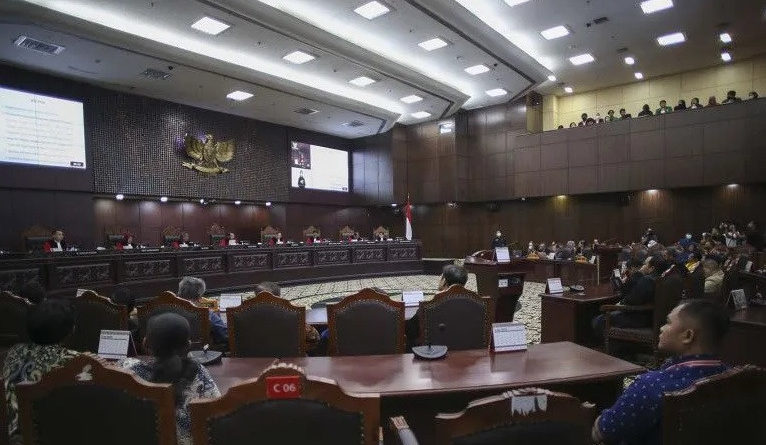OP ED | OPINION | EDITORIAL- Another test of democracy
The justices of the Constitutional Court read out their decision on a petition for judicial review regarding Law No. 7/2017 on elections, specifically regarding the open-list electoral system, during a hearing on Thursday. The court voted 8-1 to reject the petition. (Antara/Rivan Awal Lingga)

.
Editorial board (The Jakarta Post)
Jakarta
.

Indonesia survived yet another test of its hard-won democracy yesterday, when the Constitutional Court almost unanimously rejected a motion that would have essentially revived the electoral system during the New Order and surrendered the people’s right to elect legislative candidates to political parties.
The court’s justices ruled to uphold the Election Law, meaning that voters will be directly choosing among the candidates running for both the regional and national legislatures in the simultaneous elections on Feb. 14, 2024.
That only one justice dissented indicates that the petition to reinstate the closed-list proportional representation system lacked a constitutional basis. Reading the court’s arguments, it becomes clear that the six plaintiffs’ rationale, such as their belief that the open-list system is a threat to the nation-state, is just too far-fetched and nonsensical at best.
As the court stated in its considerations, the existing open-list system has maintained the pivotal role of political parties since its inception in 2009, unlike the plaintiffs’ claims. In response to the plaintiffs’ view that the open-list system was prone to vote buying, the justices said the closed-list system was no better, as it was vulnerable to “nomination buying”.
The court’s justices did everything right in refraining from the lure of changing the electoral system, an authority that constitutionally rests with the legislative and executive branches. The open-list system was the consensus that the House of Representatives and the government reached in 2008, in response to popular demand for a better electoral system that valued each vote and could lead Indonesia to become a full-fledged democracy.
Under the previous system of closed-list proportional representation, political parties, if not their elite, wielded the power to nominate only their loyal members for legislative seats. No doubt critics dubbed the lawmakers produced through this mechanism as representatives of the political elite, rather than of the people.
The plaintiffs are affiliated with the ruling Indonesian Democratic Party of Struggle (PDI-P), which was among the parties that supported the open-list system back in 2008. The PDI-P recently started calling for a return to the old system, only to meet a stiff challenge from the other eight parties in the House.
Rumors of the court’s decision favoring the plaintiffs went viral as the justices were reading out the plaintiffs’ arguments.
Former deputy law and human rights minister Denny Indrayana spread the news from Australia, citing a credible external source, that the justices had reached a majority decision to grant the demand for reinstating the closed-list balloting system. Denny later said he had deliberately circulated the information to mount pressure on the justices to stick to their conscience.
Denny’s logic “no virality, no justice” might still pay dividends, although perhaps the Constitutional Court justices had deemed the petition to be groundless from the outset.
The court has, however, been experiencing a deficit of public trust due to its controversial decisions. Most recently, the court extended the terms of Corruption Eradication Commission (KPK) commissioners to five years, allowing the antigraft body’s leadership, including its chief who is infamous for his ethics violations, to serve until 2025.
Corruption has also tainted the Constitutional Court’s reputation, with former chief justice Akil Mochtar now serving a life sentence for accepting bribes from regional head candidates who disputed the election results in 2013. Another justice, Patrialis Akbar, was also found guilty of accepting bribes in 2017 and sentenced to eight years in prison.
Despite its flaws, that the Constitutional Court upheld the citizenry’s right to vote directly for their representatives proves that hopes for democracy to flourish in the country are still alive. Going forward, Indonesia’s constitutional democracy will continue to face uphill battles, which unfortunately will include those waged by its beneficiaries.
.
EDITOR IN CHIEF
 Ads by: Memento Maxima Digital Marketing
Ads by: Memento Maxima Digital Marketing
@[email protected]
SPACE RESERVE FOR ADVERTISTMENT


 Memento Maxima Digital Marketing
Memento Maxima Digital Marketing







